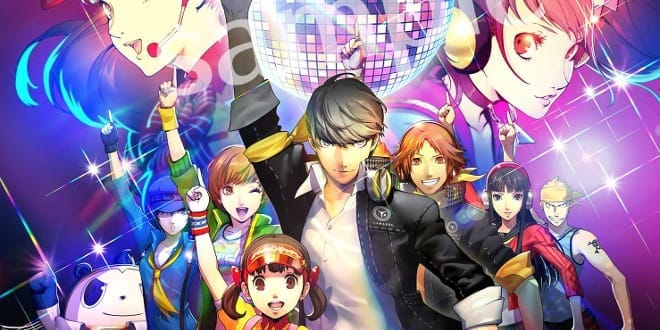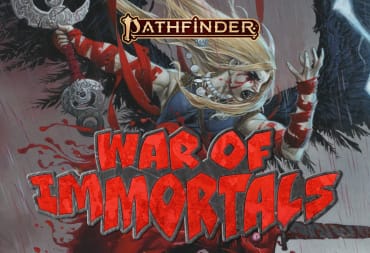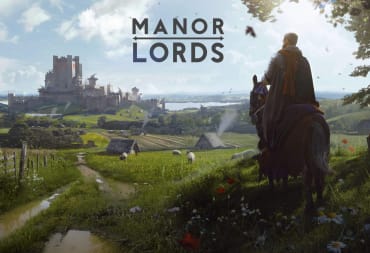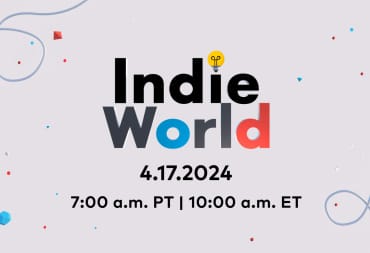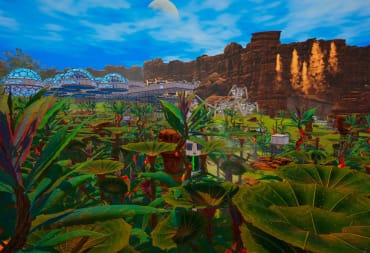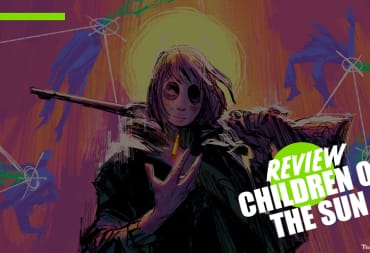One of the best-selling Vita games worldwide is Persona 4: Golden, so it goes without saying that the series has a large fanbase on the system. Persona 4: Dancing All Night is the "official" sequel to the title, also exclusive to the Vita; however, it has a twist. It is a rhythm game.
Although the game has transitioned from a turn-based jRPG with Dating Sim elements into a rhythm game, it would be a misnomer to state that the story was abandoned as a result. The first thing to note about Persona 4: Dancing All Night is that the story fits in right between the epilogue of Persona 4: Golden and the 2 fighting games. The second thing to note is that, although the story is toted as the official sequel to Persona 4: Golden and does have a significant presence in this title, the story never really gets off its feet.
I can't go into too much depth regarding why, but needless to say fans of the original game don't need to pre-occupy themselves with the story mode for this game, as most of the exposition seems to be fan service of some degree. Although the story is there, there is no relative substance to the story mode, and the only real reason to play through it is to unlock a few necessary songs, as well as to gain access to a few items in the game's shop.
To make matters worse, this time around the voice acting quality is inconsistent; Rise's new voice can be good at times, but it can also fall apart. Don't even get me started on the voice that they chose for the new character Kanamin.
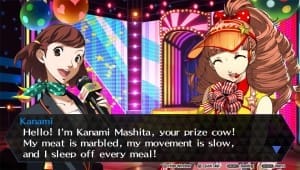
As far as the gameplay is concerned, although there have been plenty of comparisons to Hatsune Miku: Project Diva by several parties in the past, it's probably not the best comparison when it comes to describing the gameplay. Instead of having notes flying across the screen, filling out a constantly moving line of note markers like in the Project Diva games, Dancing All Night takes the gameplay from another SEGA rhythm game: Samba de Amigo.
Notes fly from the center of the screen to any of the outer edges of the game area, and players must tap any of the corresponding buttons for each section of the screen as they fly in; for example, if a note is flying towards the upper left corner of the Game UI, you must tap up on the d-pad. Double notes (where you have to hit two notes on opposite sides at the same time), hold notes (where you hit, hold, and then release a note) and scratches (optional notes hit by either swiping the touch screen, or flicking a control stick) combine with these standard notes to make up the brunt of the game. A fever mode, like in many other rhythm games, is also present and can be activated as long as the player has played enough fever scratch notes by the time that fever time would occur.
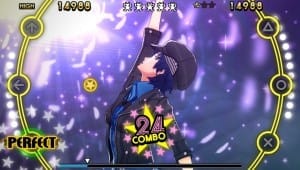
The core gameplay of the title is great; it feels and plays like a faster-paced Samba de Amigo, and while you're in on the action it's brutally fun. And if that's all that there was to playing the songs—hitting as many notes as you can in order to get ranked and/or pass—it would easily be one of my favorite rhythm games of 2015.
The soundtrack is great, featuring the fantastic original tunes from Persona 4 and its re-release + spinoffs. There are a decent amount of songs to play over and over again, albeit a smaller number than most games in the genre.
The artstyle is full of color, and although videos for each song are grounded in reality, character models and stages are bursting with fantastic visual and artistic fidelity.
Unfortunately for Persona 4: Dancing All Night, not only has 2015 been an especially great year for rhythm games—with most of the stand-out titles releasing on the Vita, no less!—but it has more than its fair share of flaws.
The biggest flaw that the game has is with its grading system, or more accurately, how it determines whether or not you've passed a song. Most rhythm games grade completion based on what percentage of notes overall that you've managed to hit, or what score that you've managed to clear. The difference with Persona 4: Dancing All Night is that clearing a song depends on the highly fluctuating state of the "Audience Gauge."
This gauge has uses within the song itself: it can determine whether or not your fever might potentially become a bond fever between two characters that are dancing and it shows how well you are currently doing in the song, but the biggest function of the gauge is to show whether or not you would pass the song if it ended at that time. If the gauge is greeen or rainbow, you would pass—if it is white, yellow, or red, you're in danger of failure.
That wouldn't be a problem, but the audience gauge tends to fluctuate wildly after only missing a few notes. Besides that, once the audience gauge falls to another color, it takes much longer to get it back up to another. I remember starting one song, and it took me a 50 note combo to get my gauge from white into green.
Once you realize that missing a few notes can have you drop all the way down to yellow, the problem becomes a bit clearer. You can spend a whole song doing perfectly, miss a few notes at the end of the line, and then fail. This choice of grading completion makes the experience seem rather arbitrary, as there was more than one time where I'd finish a song, fail, replay, get a worse score, and somehow clear that attempt.
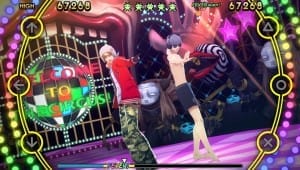
Granted, this issue is probably only relevant for players that hope to tackle the harder difficulties, but considering that the full game is retailing for $50, only 27 songs at launch, with the rest being DLC? I find it hard to justify a game that's only really enjoyable to replay at the lower difficulties. Eventually you can get used to the weird grading system, but you won't be able to stop the weird inconsistencies that it provides.
It's a shame, too, as besides the issues with scoring, everything else about the game is fantastic. Music variety is great, and a lot of the remixes on show are even better than the original songs. Plenty of unlockable costumes and items allow you to customize your play experience ... even if each song is hard-locked to one dancer each.
Unfortunately, that seems to be the running gag regarding the title. It does so much right, but then it ends up doing so many other things wrong as well. The music is great, but there's fewer songs here than most rhythm games offer. There's a variety of difficulty modes, but the upper two are frustrating for the rhythm game veterans that would even bother unlocking and playing them—that doesn't even go into the fact that you basically have to 100% the game just to unlock that last difficulty.
When it comes down to it, I'm incredibly conflicted about this game. I want to love it because the core gameplay is so great, but then there are the issues that I simply can't ignore holding everything else back. If the issues were minor, I'd have no trouble giving the game high marks, but unfortunately the lack of polish means that every time that I start to have fun something pops up and reminds me of the game's rather grievous faults. The biggest problem the game has is the fact that it's so consistent in its inconsistency. Newcomers to the genre will find the most to love about this game, but for veterans such as myself, there are much better games out there.
A review copy of the title was provided by the publisher.
Review Summary
There's a lot to like about Persona 4: Dancing All Night; unfortunately a lack of cohesive game design hinders the product as a whole. For an MSRP of $50, justifying a purchase is difficult. It's good, but compared to the competition, it flounders.
(Review Policy)Have a tip, or want to point out something we missed? Leave a Comment or e-mail us at tips@techraptor.net
